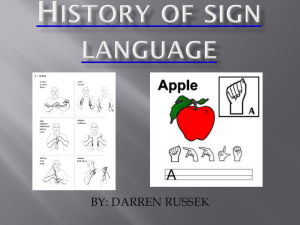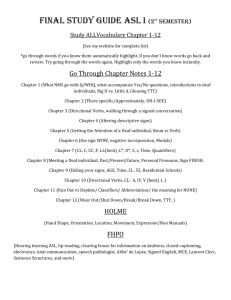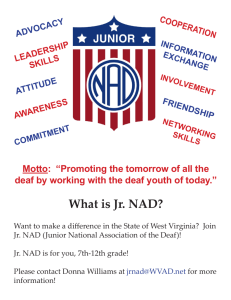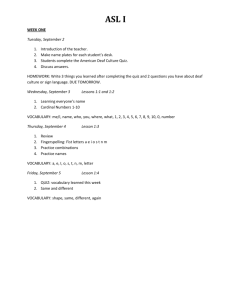De'VIA: Deaf View/Image Art - Exploring Deaf Culture
advertisement
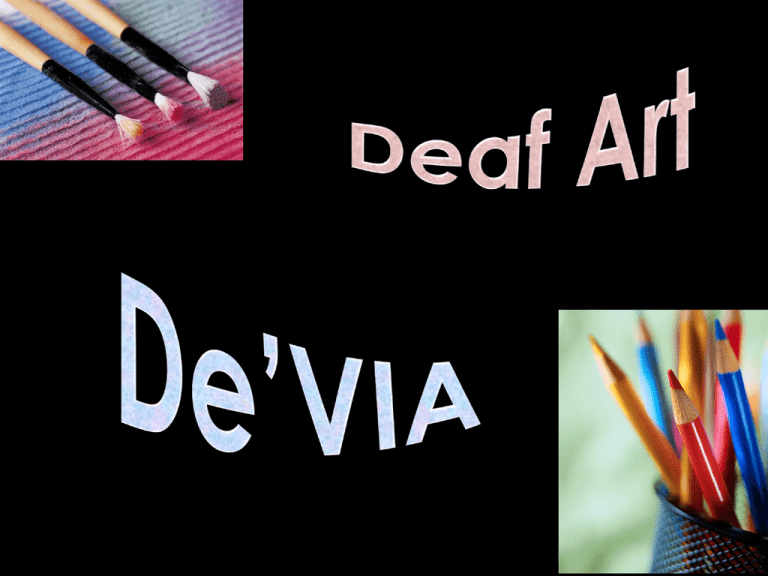
Objectives You will… • learn the difference between Deaf artists and De'VIA artists • understand the De’VIA is an important part of Deaf Culture and Deaf History • observe the various De’VIA themes and artworks from different De’VIA artists • explore ways to include De’VIA in your classroom What is De’VIA? De'VIA is short for Deaf View/Image Art http://www.facebook.com/pages/DeVIA-Artists/189802827726501 De’VIA ? • There is a difference between Deaf artists and De'VIA artists. • Deaf artists are those who use art in any form, media, or subject matter, and who are held to the same artistic standards as other artists. • Example… Redmond Granville De’VIA ? • De'VIA is created when the artist intends to express his or her Deaf experience through visual art. “Deaf art expresses the values of Deaf culture— the beauty of sign language and its painful oppression, the joys of Deaf bonding, communication breakdowns between signers and non-signers, the discovery of language and community, and the history of Deaf people,” – Chuck Baird http://www.gallaudet.edu/clerc_center/chuck_baird_shares_his_vision_of_deaf_art_and_culture.html Viva De'VIA In 1989 nine Deaf artists came together to discuss Deaf art and came up with the name Deaf View/Image Art (De'VIA). The 9 Deaf artists 1. 2. 3. 4. 5. 6. 7. 8. 9. Dr. Betty G. Miller, painter; Dr. Paul Johnston, sculptor; Dr. Deborah M. Sonnenstrahl, art historian; Chuck Baird, painter; Guy Wonder, sculptor; Alex Wilhite, painter; Sandi Inches Vasnick, fiber artist; Nancy Creighton, fiber artist; Lai-Yok Ho, video artist. Viva De'VIA • “De'VIA represents Deaf artists and perceptions based on their Deaf experiences. It uses formal art elements with the intention of expressing innate cultural or physical Deaf experience. These experiences may include Deaf metaphors, Deaf perspectives, and Deaf insight in relationship with the environment (both the natural world and Deaf cultural environment), spiritual and everyday life.” (De'VIA Manifesto, 1989) • De'VIA may also be created by deafened or hearing artists, if the intention is to create work that is born of their Deaf experience (a possible example would be a hearing child of Deaf parents). www.rit.edu/deafartists http://www.deafart.org/ De’VIA Themes Milan Italy by Mary Thornley • Hands • Sounds • Faces • ASL • Resistance • History • Homage Homage to Clerc by Jean Boutcher Resistance vs. Affirmation Art Resistance Deaf Art Audism Oralism Mainstreaming Cochlear Implants Identity Confusion Eugenics Affirmation Deaf Art Empowerment ASL Affiliation Acculturation Acceptance Deafhood Betty G. Miller Betty Miller is one of the first Deaf American artist to express her Deaf experience through her artworks. • Dr. Betty G. Miller of Philadelphia, PA was born to deaf parents in Chicago, Illinois. She is a well-known professional Deaf Artist who taught art at Gallaudet University for 18 years. • In 1971, Betty G. Miller began expressing her Deaf experiences through her paintings and drawings. Since then her work has inspired several Deaf visual artists to create work based on their Deaf experiences Betty Miller Artist's Statement • "Much of my work depicts the Deaf experience expressed in the most appropriate form of communication: visual art. I present both the suppression, and the beauty of Deaf Culture and American Sign Language as I see it; in the past, and in the present. I hope this work, and the understanding that may arise from this visual expression, will help bridge the gap between the Deaf world, and the hearing world." Betty Miller’s Resistance Deaf Artworks Amenslan Prohibited Education Deaf Betty Miller’s Affirmation Deaf Artworks Growing in ASL Deaf Picnic • Chuck Baird was born deaf in Kansas City and along with his three older sisters, went to the Kansas School for the Deaf. Chuck Baird’s Resistance Deaf Artworks Mechanical Ear Oppression Chuck Baird’s Affirmation Deaf Artworks This simple exchange is symbolic of the breakthrough from isolation and loneliness (that many deaf children feel before they meet other deaf people) to the welcoming arms that draw a deaf newcomer into the fold of the Deaf culture Indianapolis, Indiana http://www.warrenmillerart.com/welcome.html Warren Miller’s Resistance Deaf Artworks Interview Family Tradition Warren Miller’s Affirmation Deaf Artworks Videophone Dummy Hoy • Susan Dupor was born deaf and has an older brother who was born hard of hearing. Susan Dupor Artist's Statement • "As an artist who is Deaf, I am constantly exploring my identity as a Deaf woman. I have been painting within this theme for the past ten years and my perspective has changed throughout the years. There were moments when I vented my emotions, and others when I wanted to celebrate the uniqueness of Deaf culture and seek the ironies of being Deaf in a hearing world." Audism An attitude based on pathological thinking, which results in a negative stigma toward anyone who does not hear; like racism, sexism, audism judges, labels, and limits individuals on the basis of whether a person hears and speaks. Ann Silver • Born deaf into a hearing family in Seattle, WA, in 1949, Ann Silver attended public schools. • As professional support services did not exist, her childhood education, she says, "was 90% guesswork, 10% art." For over three decades, Silver has been a driving force for the recognition and inclusion of Deaf Art in the world of art, architecture, public art, and academia. Latest addition to her repertoire are several murals integrated into the walls of a building at the Washington School for the Deaf in Vancouver, believed to be the world's largest ASL-based public art. Guy Wonder • A 3rd generation Deaf man, Guy was raised in a Deaf family and attended a residential school for the Deaf in Vancouver, Washington Video Clip “Guy Wonder Discusses His Artwork” Grandpa’s Treasures Welcome Friends Dr. McGregor He helped with establishing a national organization for Native American Deaf individuals (now called Intertribal Deaf Council). Self Portrait Gourd Orkid Sassouni Girl Talking Scott Upton • Scott Upton is Deaf and is from Canada. Scott is a desktop publisher, graphic designer, digital artist and pressman. He lives and works in Kingston, Ontario. Dolphins Love Lee Ivey Bernard Bragg Deaf Power De’VIA Lessons in your Classroom Deaf Artists in America: Colonial to Contemporary by Deborah M. Sonnenstrahl Gallaudet University Deaf Collections and Archives – “Search the Artwork and Artifacts Catalog” http://www.gallaudet.edu/library_deaf_collections_and_archives.html • “Understanding De’VIA by Nancy Rourk” • “Nancy Rourke 2011 Paintings De’VIA/Deaf Art” • “Interview with Deaf Artist nancy Rourke” • “American De’VIA Artist: Chuck Baird and his Journey (2010) • “Charles Wildbank, Deaf Artist” • “De’VIA Artist- Pam Witcher” www.rit.edu/deafartists www.rit.edu/deafartists De’VIA Themes • • • • • • • Hands Sounds Faces ASL Resistance History Homage 1. “Expressions of Culture” 2. De’VIA 3. “De’VIA Posters” www.rit.edu/deafartists Viva De'VIA Introduction Hands Sound Faces ASL Resistance History Homage www.rit.edu/deafartists By last name: A-F Animation Papermaking Cartoons G-P Ceramics Photography Q-Z Digital Art Printmaking Mixed Media Sculpture Painting Stained Glass Textiles Explore an Artist • What kind of artist is Matt Daigle? • Did Matt grow up in a hearing or a deaf family? • Pick your favorite art work from Matt Daigle to show to class (via Internet) and explain why you like it. • What kind of medium does Scott Upton use? • Where does he live? • What was his first design? • What is his favorite design? • Pick your favorite artwork from Upton to show to class (via Internet) and explain why you like it. www.rit.edu/deafartists Artist Interviews Collage http://www2.bakersfieldcollege.edu/tmoran/asl1%20posters.htm http://www2.bakersfieldcollege.edu/tmoran/asl1%20posters.htm Homage http://www2.bakersfieldcollege.edu/tmoran/asl1%20posters.htm www.rit.edu/deafartists Forming of Me by Heath Focken Pink Girl by Emily Cooper Questions to ask your students • What is your opinion about the Resistance and Affirmation artworks . • Do you find ways to express your frustrations and triumphs in life? If so, how? • What are the advantages and disadvantages of being deaf? • Who is your favorite deaf artist and why?

